What Is Budget in Google Ads?
First, before we can explain how much you can set aside for your paid ads campaigns, we have to explain what budgets are in the context of Google Ads. Thankfully, this is an easy one to explain: a budget is simply the amount that you’re comfortable spending for a single paid ad campaign. In other words, your budget is the limit that you set on how much you’ll be spending on ads in a month.
However, bear in mind that your ads won’t necessarily cost you as much as you’ve budgeted, and they could even cost you less over the course of a month.
What Is Daily Budget in Google Ads?
Since Google Ads determines your budget on a daily basis, daily budget is the average Google Ads budget per day that you’re willing to invest. This is the limit of how much money you’ll be allowing Google to charge you per day for your adverts.
If you want to calculate what your monthly budget on Google Ads should be, simply multiple your daily budget by 30.4, which is the average number of days in a month.
How to Calculate Your Google Ads Budget
In order to know how much to budget for Google Ads, you’re going to actually need to know what the factors that influence what your budget should be are. Buckle up your seatbelts for this one, as there are actually many factors, which would include:
- PPC Strategy: depending on your overall paid ads strategy, you might need to need to adjust how much you spend on Google Ads. If you’re only using search ads, for instance, your budget will be lower than if you choose to use search ads, display ads, and video ads at the same time.
- Industry: not all industries are equal in marketing, and some industries require you to spend a hell of a lot more than others. In fact, there are some industries which are notorious for requiring much more investment than normal, including the legal and finance niches.
- Bidding Strategy: when you’re bidding on keywords, you need to compete with other businesses who are also bidding on the same keywords. Naturally, this means that you need to adjust how much spend for a keyword depending on how competitive it is and how much you want to increase the ranking of your ads.
- Targeted Audience: are you targeting a very specific audience with a particular product? Or are you trying to reach as many people as possible with your services? Depending on who you’re targeting, and how many, then you might need to consider different budgets.
- Quality Score & Ad Rank: Quality Score is a Google diagnostic tool that determines how relevant your ad is to users; the higher the quality score, the more relevant the ads, the less they cost you and the higher your Ad Rank. Ad Rank is a score that determines where your ad will show up in results: the higher the score, the higher up your ad will appear, and the more visibility it gets. Depending on both of these scores, your ads might cost you less, or sometimes more.
- Keywords: which keywords and how many of them you’re bidding on will impact how much you’re spending. This is because some keywords are more expensive than others, especially those keywords with commercial intent, while bidding on more keywords mean you need to spend more money.
- Market Trends: markets are constantly in flux, with seasonal holidays being a prime example of this. So, if you’re an ecommorce business, for instance, you’re probably going to need to spend more during Christmas times and Black Friday than during other times of the year.
And those are definitely not the full list of factors that determine how much you need to set as a daily budget. But knowing these factors can only get you so far, and there are few more considerations that you need to bear in mind in order to learn how to calculate a Google Ads budget.
First of all, you need to set your marketing goals. In other words, what you want to achieve through using Google Ads as a marketing channel and how many customers you need to gain in order for you to justify the investment. To do this, you first need to discover the cost per click (CPC for short) of your relevant keywords.
This would give you an estimate of how much you need to spend in order to get the number of visitors that align with your marketing goals. For instance, if your most important keywords run up a collective cost of $3 per click, then you need to take that into account when aiming for a certain number of leads.
So, let’s say you need to gain 200 leads per month: that would mean that you need $600 to gain these 200 visitors. However, these visitors aren’t necessarily customers: after all, just because they clicked on your ad, doesn’t mean that they’re going to convert. This means that you need to do another calculation, which would be your cost per acquisition (or CPA for short).
CPA is calculated by dividing the amount you spent on paid ads over a certain period (let’s say a month), and the total number of conversions you’ve made over that period. So, let’s say that out of those 200 visitors, at least 20 converted. That would mean your CPA is $30. Depending on your industry, this might make sense for you.
For example, if each one of your conversions spent at least $100, then that’s already $70 profit over the amount you’ve spent on advertising!
What Is the Minimum Budget for Google Ads?
Now that we’ve gone over all of the factors that really determine what your ideal Google Ads budget should be, what’s the actual minimum that you ought to consider spending? Now the issue here is that while you can set a small budget, you likely won’t be seeing much results, and that’s for various reasons.
For example, you’ll be extremely limited in both your bidding strategies as well as your choice of keywords. You won’t be able to outbid your competitors if you stick to a small minimum daily budget for Google Ads, and you won’t be able to choose the most profitable keywords, or even be able to select a range of keywords.
If you’re just starting out in the world of PPC, and you want to learn how to use Google Ads effectively, then yes, sticking to a minimum Google Ad spend is a good idea because you’ll be essentially spending money simply to gain some experience with the platform. That means you likely won’t be spending that money to make a profit.
If you’re in this situation, then the usual rule of thumb is to start out with a Google Ads starting budget of somewhere in the range of $10–$50. This might seem like quite a bit of money (around $300–$1500 per month), but first of all, this is actually lower than paid ad budgets set by even small businesses. Secondly, think of it as investing in your own skills, so it’s still money well spent.
However, if you’re a business owner that is serious about your business’ revenue, then sticking to a much higher minimum is recommended. This is because the results you’ll receive from Google Ads will really depend on how much you’ve invested. More on this in the upcoming sections.
But before that, if you’re in this situation, then we would highly recommend hiring a specialist or contracting an agency in order to manage your paid ads. If you’re interested, you can contact us and get a free 30-min PPC audit!
How Much Do You Need to Spend on Google Ads to See Results?
Now we’re getting to the part that should most interest our readers, and that’s how much you really need to spend in order to see the desired results. Of course, as we have been saying so far in this article, the answer will depend upon many variables, and each business will have its own unique mixture of circumstances and requirements.
However, as we’ve said under the previous heading, to see any real results, you need to make a significant investment. It’s not enough to set a minimum Google Ads budget of around $10–$20, sit back, and watch the clicks come rolling in: it doesn’t work like that at all. Not in PPC at least.
We’ll be looking at amounts in the coming sections, but determining how much money to spend on Google Ads for actual results is a careful balancing act between how much you’re willing to invest, how many clients you need to acquire every day, and how much an individual client might typically spend when converting.
How Much to Spend on Google Ads Per Day?
As we’ve said, determing the best daily budget for Google Ads is going to depend upon the careful calculation of how much you’re comfortable investing in paid ads, your goals with this investment, and how much you can make in potential returns. With all of these factors in mind, you’ll be able to calculate the ideal amount to spend and see results.
So, let’s look at this with an example. Let’s start with how many clicks you need to generate a day in order for your Google Ads investment to actually make sense. Let’s say that you need at least 10 clicks per day to consider it worthwhile to invest in Google Ads.
Next, you need to then select your best keywords in order to see how much your total CPC will be. This will be an aggregate amount since it would be ideal to select multiple keywords. Let’s say that you’ve selected a mixture of long-tail and mid-tail keywords, amount to a total CPC of $6.
To generate your 10 clicks per day, you need to spend a total of $60 every day on Google Ads. However, just because you’ve gotten 10 clicks, doesn’t mean that you’ve gotten 10 customers. Let’s assume that out of those 10 clicks, only 2 people actually converted, which is a conversion rate of 20%.
This is still much higher than what the average conversion rate in Google Ads was in 2023: 7.04%, according to WordStream. Now let’s say that the 2 people who converted spent a total of $170; that essentially means that you’ve made a profit of $110 from your original investment of $60.
Now if instead of 10 clicks, you actually need 10 customers every day, then you should bear conversion rates in mind, which vary wildly across industries:
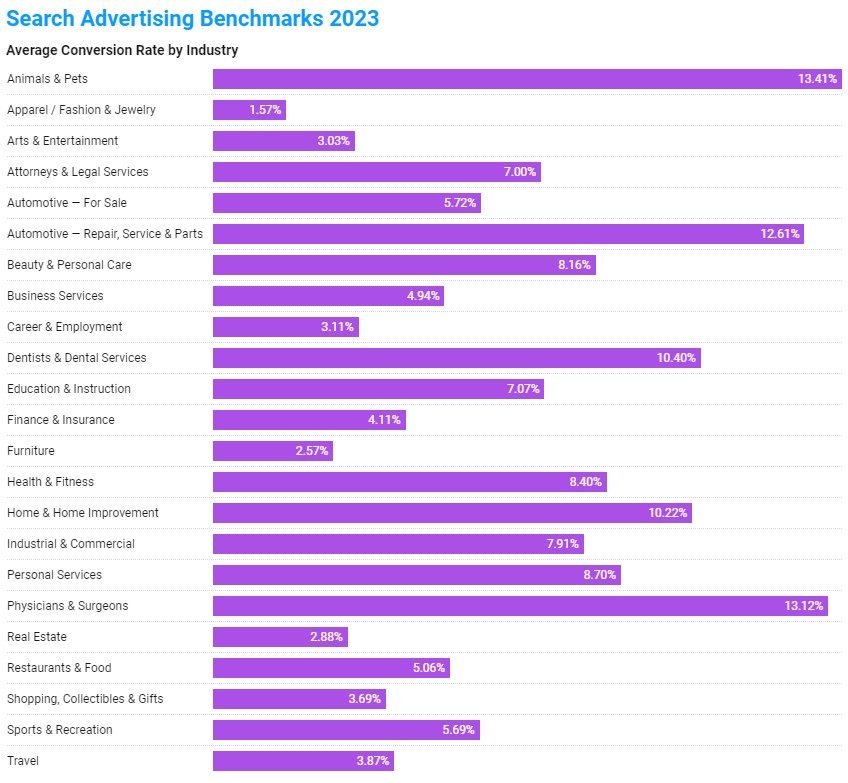
But let’s stick to our (very optimistic) 20% to simplify matters. To gain 10 customers with a conversion rate of 20%, you need to receive 100 clicks. With a CPC of $6, that amounts to $600 every day. That’s why planning your marketing goals is important because with different targets, you need different investments.
How Much to Spend on Google Ads Per Month?
Calculating your budget through your estimated daily ad spend is useful because the Google advertising platform itself uses a daily budget. So, from that point of view, calculating your Google Ads daily budget is useful because you need to set a daily limit. However, it’s far less useful for budgeting and keeping track of your finances.
Therefore, it’s much more convenient to think in terms of monthly budgets for this purpose. Let’s stick to the same example that we looked at in the previous section: now let’s say that you’re a small business that only needs 10 clicks a day to justify the investment.
To calculate your monthly spend, you need to multiple your daily budget by 30.4 (which is the average number of days in a month throughout the year). This would mean that your monthly budget would be about $1,800. This is actually a decent amount to spend every month on Google Ads.
Now let’s say that you’re a bigger business, and with 10 clicks a day you’re barely marking a mark in your revenue. Instead, you would need at least 100 clicks to make a difference. Using our previous example, that means you need to spend $600 to gain 100 clicks a day. With the same calculation, you would need to invest $18,240 a month to sustain those clicks.
Best Amount to Spend on Google Ads
Finally, if you’re still wondering what our recommended Google Ads budget is in terms of actual numbers, then let’s take a look at some figures. First, take a look at this handy chart that provides a range of recommended daily budgets across industries:
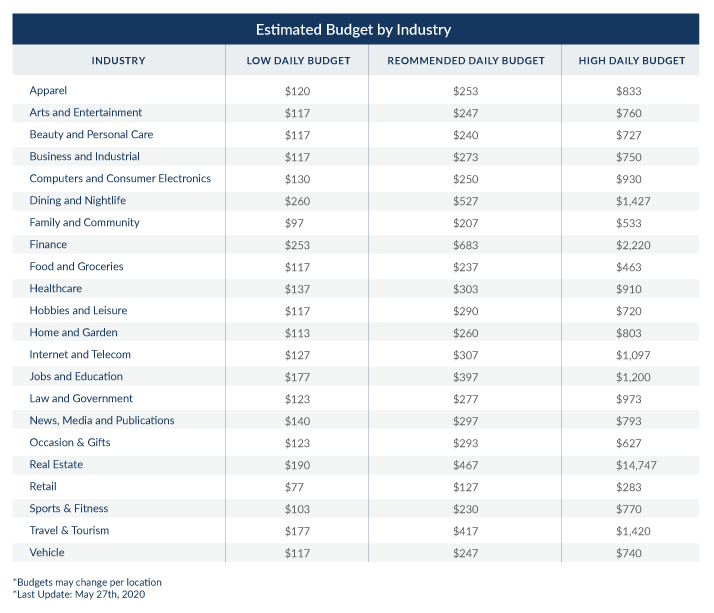
This will give you a good idea of how much you ought to spend every day on Google Ads depending on your industry. As you can see, the recommended amounts vary quite a bit depending on the niche businesses are operating in. But what about the recommended budget depending on business size? Let’s take a look:
- Small Businesses: $50–$250 per day
- Mid-Size Businesses: $250–$1000 per day
- Large Businesses: $500–$2000 per day
These are more or less recommended amounts based on our years of experience; but as we’ve seen, the amounts will change depending not only on your industry and business size, but also on what you’d like to accomplish with your marketing. But what about monthly amounts?
- Small Businesses: $1500–$7500 per month
- Mid-Size Businesses: $7500–$30,000 per month
- Large Businesses: $15,000–$60,000 per month
Don’t take these amounts as gospel: they’re just recommendations. In reality, your daily and monthly budgets might look different to these.
How Much Do Companies Spend on Google Ads?
As we have already said, there are many factors that influence how much companies are required to spend on Google Ads. However, how much do companies actually spend per month on Google Ads? It’s one thing to talk about ideal budgets and figures, and quite another to look at real data.
According to WordStream, the biggest brands in various industries spend anywhere between $40–$50 million per year on paid ads. Moreover, recent research by Semrush has uncovered that a bit over one half of the Fortune 100 companies spend over a million on paid advertising:
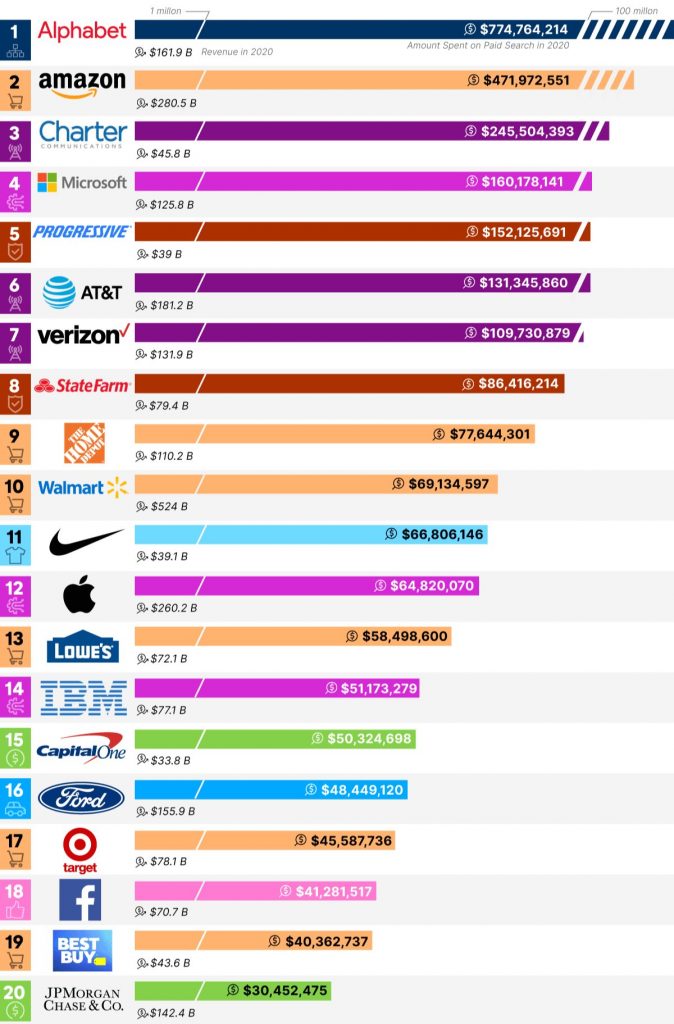
Of course, we don’t think any of our readers are directors of any of these companies. In fact, much smaller businesses don’t even need to think about spending anything over $10,000 a year on paid advertising. Naturally, the average monthly Google Ad spend will differ by industry.
According to WordStream, the average spend on Google Ads per month across small to mid-sized businesses is only slightly less than $10,000. However, there are massive fluctuations here: for instance, small businesses in the real estate, home services, and healthcare industries spend anywhere between $500–$3000 on paid advertising.
Average Google Ad Spend by Industry
Thankfully, there are a few studies out there that track what the average budget for Google Ads is across a variety of industries. Well, in a way. This is because you cannot really calculate how much businesses really budget, but more how much they spend on average on their ads.
This is done through calculating the average CPC across a variety of keywords stretched across multiple industries. In fact, let’s take a look at some average CPC data compiled by LocaliQ:
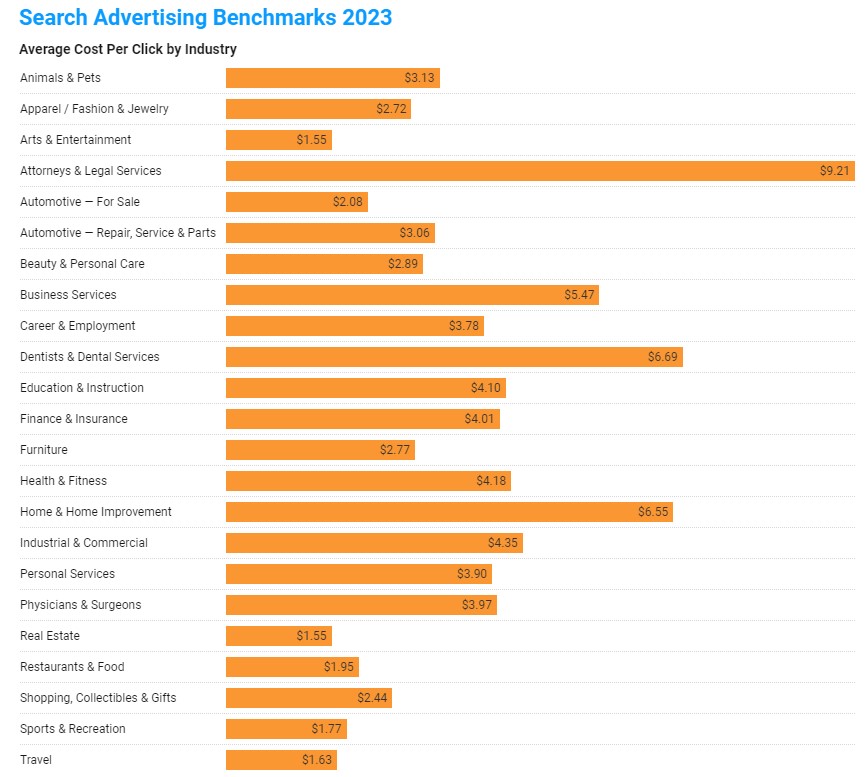
This is a great guide for gauging how much you need to budget for ad spend as you need to calculate your budget from the CPC of your chosen keywords. Another interesting graph worth looking at is this one created by WordStream:
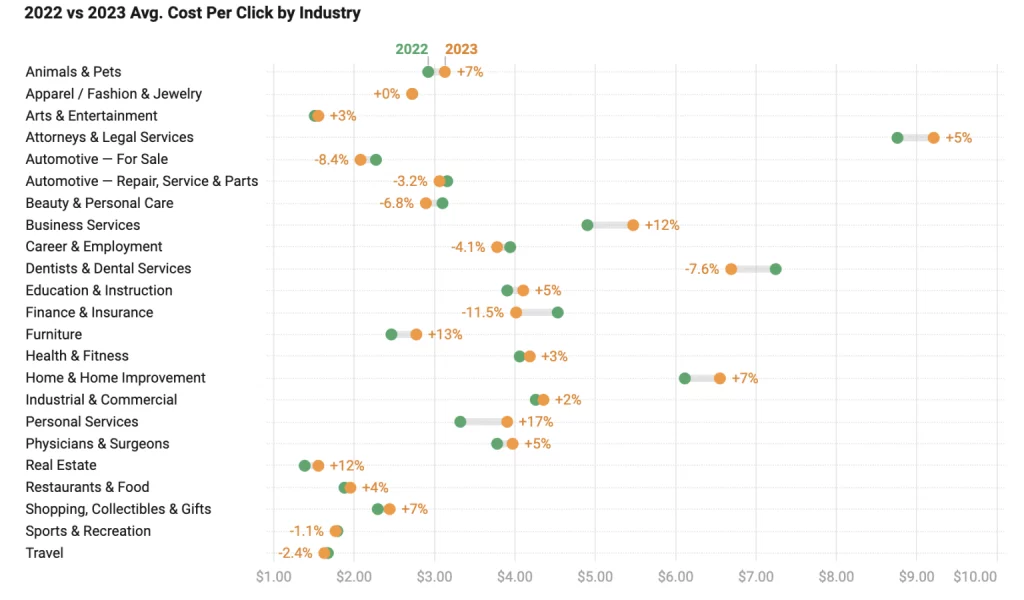
This is exactly why market trends are a factor in determing your budget as there are sometimes massive differences in the average CPC of keywords between the years!
When to Increase Google Ads Budget
If you’re unsure about the results from this paid advertising method, it would make sense to stick to a minimum spend on Google Ads and only increase when it starts bearing fruit. However, the logic of this, while actually sound, is fundamentally flawed in the context of Google Ads and PPC.
Unlike other marketing methods, like SEO where starting off small is justifiable because of compound returns (when results and returns start accumulating over your original investment), Google Ads doesn’t work like that since your returns are proportional to your investment.
So, as we’ve already seen, it’s not really a good idea to start off small. Indeed, it’s much better to start off with a substantial amount and then increase it slowly according to certain circumstances. For instance, it would be a good idea to increase your budget if you’re approaching a period that can mean more sales.
For example, if Black Friday is approaching, it would be a good idea to increase your budget in order to maximize the sales opportunities that such a period offers. Another good reason would be to increase how many conversions you’re receiving once your Google Ads are hitting all of your marketing goals.
In other words, once you’ve reached your marketing goals for a while, it might be time to re-evaluate them and aim for a higher number of leads, conversions, and so on.
How to Increase Google Ads Budget
If you’ve been convinced that Google Ads is a worthwhile investment, and you would like to even invest more, then there’s an easy way to do this. Of course, if a Google Ads agency is taking care of your ads, they would know how to do this and would do it for you; all you need to do is simply invest more.
However, if you’re managing your own Google Ads, then the process is very simple:
- Log in to your Google Ads account;
- Once you’re in your account, go to “Campaigns”;
- From there, look for the campaign/s whose amount you’d like to adjust;
- Hover over the “Budget” column of the campaign/s whose bids you’d like to increase;
- Click on the small pencil icon that shows up;
- Enter the new amount that you’d like to set;
- Click “Save”.
That’s really all there is to it!
Are Google Ads Really Worth It?
With all this talk of Google Ads budgeting and money, there’s a very pertinent question that is bound to come up: are Google Ads worth it? After all, if using this marketing channel doesn’t bring you the traffic and leads necessary to justify your investment, then what’s really the point, right?
However, the reality is that you can receive a significant ROI (return on investment) from Google Ads; in fact, research by Google itself has shown that, on average, Google Ads generates a whopping 800% ROI for businesses. That’s $8 for every $1 spent—that’s definitely an ROI to write home about.
Financial benefits aside, there’s also the matter than Google Ads can produce results much quicker than many other forms of digital marketing, especially SEO. While SEO is a long-term marketing strategy that requires many months, if not years, to reap its benefits, paid advertising won’t take you more than a couple of months at most.
There are also other benefits, including the ability to really carve out your niche thanks to the multiple targeting features afforded to you by Google. Finally, there are also multiple parameters that you can set in order to prevent wasted budget as much as possible.
All in all, we believe that Google Ads are definitely worth the investment, and that any business that’s interested in gaining more customers and traffic should seriously consider using this marketing method.
Is Google Ads Worth It with a Small Budget?
What about when you could a small Google Ads minimum budget? Are Google Ads still worth the investment then? This is a great question to ask as it would seem unfair to be unable to use all of the marketing tools at your disposal just because you don’t happen to have as deep pockets as some other businesses.
That would Google Ads seem like a competition between who can throw the most cash at the platform. In reality, the truth couldn’t be further from this and there are things that you can do to get around having a small budget.
Firstly, you could leverage what are known as long-tail keywords: these are highly specific keywords where users are usually certain of what they’re searching. The only problem with these keywords is that they usually have very low search volume (in other words, the number of times they’re searched for).
However, this is generally made up for by the fact that these keywords tend to convert more than terms with higher volumes. Then there’s also the fact that even if you’re throwing as much money as possible at your paid ads, if you’re delivering ads and landing pages that simply don’t satisfy users, your ads are going to suffer as a result.
In fact, with a landing page that doesn’t provide a good user experience, your ads will lose their ranking and even become more expensive.
Overall, there are ways to work around a smaller budget, making Google Ads possibly worth your while just the same.
Looking for Someone to Manage Your Google Ads?
If all of this is too complicated for you (and we wouldn’t blame you!), then it might be a good idea to hire a specialist or contract an agency to manage your Google Ads campaigns for you. This is because unless you have the appropriate knowhow to conduct paid advertising, then there’s a chance you’ll do more harm than good.
In fact, there’s a risk that you’ll blow your allocated Google Ads monthly budget with nothing show for it. And without the right knowledge, you wouldn’t know how to set an appropriate daily budget for Google Ads that makes sense for your business. This is on top of the fact that managing paid ads takes a lot of time.
So, all in all, you’re going to need 3 things to excel at Google Ads: time, money, and experience. If you lack any of the 3, then you’re paid ads are bound to suffer. In other words, it’s a good idea to hire someone to handle your Google Ads for you if you’re lack in both time and experience (if you’re lacking in budget, then we’re afraid that no one can really help with that!).
It’s also a good idea to contact nothing but the best Google Ads agency or specialist your money can buy. Trust us, it’s worth the investment. We ourselves are a trustworthy agency that has already managed thousands in Google Ad spend with amazing results. If you’re interested in our services, contact us!
FAQs
What is a good Google Ads budget?
A good budget for Google Ads will differ depending on a host of factors, including your industry, your marketing goals, the amount of money you’re willing to invest or are able to afford, and so on. Once you have all of these determined, then determining a good daily budget will easily follow.
Is $5 a day good for Google Ads?
If all you can afford to spend on Google Ads is $5 a day, then there are some cases where it would be enough. For example, if you’re only using Google Ads to learn or else if you’re a small business operating in an uncompetitive niche. However, beyond that, $5 as a daily budget won’t get you much in the way of results.
Is $10 a day enough for Google Ads?
While it’s not much, $10 could prove to be a good enough Google Ads minimum daily budget. However, it is not an ideal amount to spend if you’re serious about building your business. We would recommend a minimum of $50 as a small business in order to see significant results. Having said that, $10 might be a good starting point, especially if you’re a microbusiness.
Is $500 enough for Google Ads?
Depending on your marketing goals, industry, business size, etc. $500 might be good enough for Google Ads. It also depends on how you use the $500: if it’s for a monthly budget, then that translates to roughly $16 per day, which is not bad for a small business. If it’s $500 as a daily budget, then yes, it would be a good amount for a mid-size business.
Is $1000 enough for Google Ads?
If we’re talking as a monthly budget, then that’s approximately $33 per day. This is below our recommended amount, but it might serve you well if you’re a small business. On the other hand, if we’re talking $1000 as a daily budget, then that’s a pretty good budget for mid-sized and even large businesses, and will certainly guarantee a lot of traffic.



